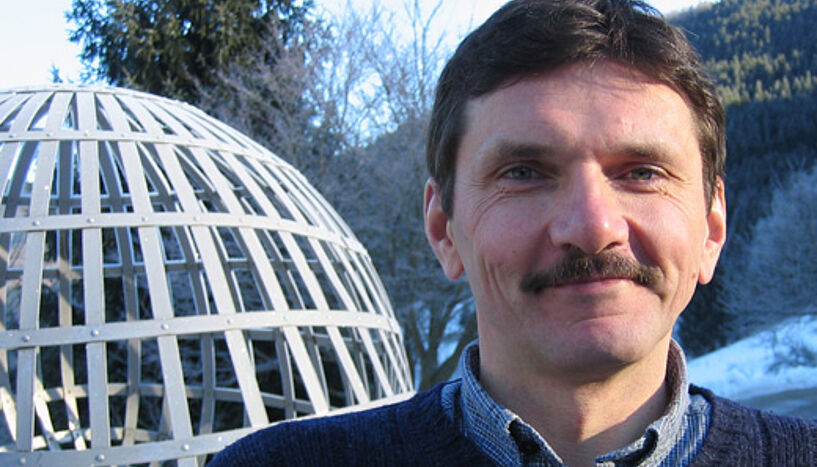Piotr Chruściel: Space, time and mathematics
| 21. Januar 2011
On Wednesday 26 January 2011, Piotr Chruściel holds his Inaugural Lecture on "General Relativity? Physics or Mathematics?" (Photo: MFO)
Since April 2010, Piotr Chruściel holds the professorship for Gravitational Physics at the Faculty of Physics. Prior to his affiliation with the University of Vienna he carried out research and taught in renowned institutions such as the University of Oxford and the Max Planck Institute for Gravitational Physics. On Wednesday 26 January, 5 pm, he will address the question "General relativity: Physics or Mathematics?" in his inaugural lecture in the Main Ceremonial Chamber.
"I don't really know if I should call myself a physicist or a mathematician", Chruściel, born in Poland, laughs and adds: "It's a little bit schizophrenic. Most of the time I worked in mathematics departments, even though I often do have closer contact to physicists." Piotr Chruściel took the position of professor at the University of Vienna in April 2010. Before that he had already collaborated with a few scholars who are closely related to the department he was about to join: "Vienna has a strong tradition of high quality work in the field of physics. Besides, there is great music around and the mountains are close by. I do enjoy that very much."
Career path
Working as a research associate physicist at Yale University at the beginning of his scientific career had a positive impact on his life. Back then he was in the group of Vincent Moncrief, a scholar known for his expertise in mathematical relativity. The collaboration confirmed his interest in this field. Chruściel continued his career at the Australian National University in Canberra and the Université de Tours in France and wrote his habilitation thesis on "Asymptotic problems in general relativity" at the Polish Academy of Sciences. He then worked at, among others, the University of California, the Newton Institute for Mathematical Sciences in Cambridge, the Max Planck Institute for Gravitational Physics in Golm and the University of Oxford.
Of space-time …
Chruściel's research interests are centred in the area of general relativity and address all mathematical problems that arise in Einstein's theory. The general theory of relativity provides a description of gravity as a geometric property of space and time. Combined into a continuum, 'space-time' is to be understood as a four-dimensional structure, whose curvature is directly related to matter. It is mathematical physics the scholar is focusing on, using the tool of partial differential equations to address questions of global properties of space-time: What can we say about the topology of space-time? How can we influence it?
… and shortcuts
"The most amusing results I have been involved with were published in a paper called 'Space-time engineering'. We showed that it is possible to create 'tunnels' to join various points in space-time. For the construction of such wormholes - shortcuts through space-time - you have to consider the topology, say, two objects you want to connect together with some kind of other topological object. That's something people have been talking about for years and it is used in many science fiction books", Chruściel explains.
The other question though: Can you create such topological objects while satisfying the equations of general relativity? That's what the scholar proved with his two colleagues Isenberg and Pollack: It is possible to create a worm hole while maintaining all energy conditions. "It is going to shrink very fast, but you can construct such things", the physicist/mathematician explains: "We are not telling you how to do this. But we are telling you that you can do it."
Teaching experiences
His students in Vienna currently have the pleasure of attending his lecture on "Relativity and Cosmology". Compared to Oxford University, the last university Chruściel has been affiliated to, he has to deal with new challenges in teaching. Oxford works with a system of lectures and tutorials. The latter are given to one or two students, rather than a class of 20. "When the students come to see you, he/she has already done the work. Instead of coming to an 'Übungen'-class where I show things, they have to find out by themselves. It's a great system for the best ones, but I had students in Oxford who were really struggling and had a miserable time - even though they were still very good. Apart from that, it's way too expensive. It can only work for the selected few", the scholar describes his experiences.
Inaugural Lecture
On Wednesday 26 January 2011, Piotr Chruściel will hold his Inaugural Lecture: "It is going to be a review of the main achievements of general relativity, from both the perspective of mathematics and physics. I'll talk about highlights of mathematical relativity and experimental general relativity. Details to follow next week", he laughs and concentrates again on the few things he needs for solving mathematical questions of general relativity: a computer, access to the internet, pen and paper. (dh)
Univ.-Prof. Piotr T.Chruściel, MSc PhD Professor of Gravitational Physics at the Faculty of Physics holds his Inaugural Lecture "General Relativity? Physics or Mathematics?” on Wednesday 26 January 2011, 5 pm, in the Main Ceremonial Chamber.
Downloads:
AVL_Chrusciel_WEB_02.pdf
Dateigröße: 802,78 KB
